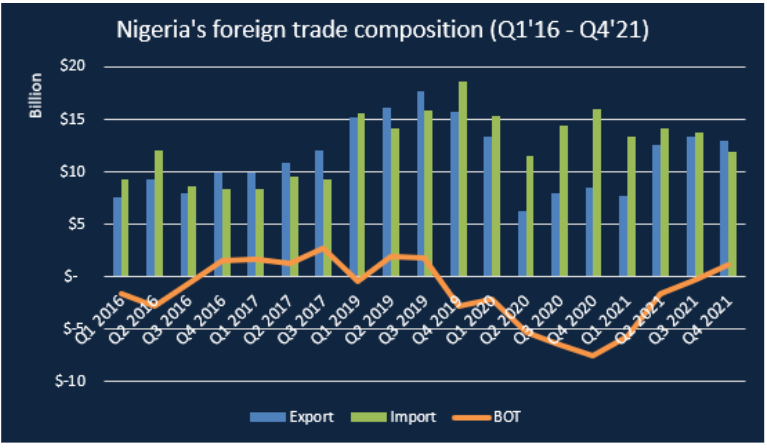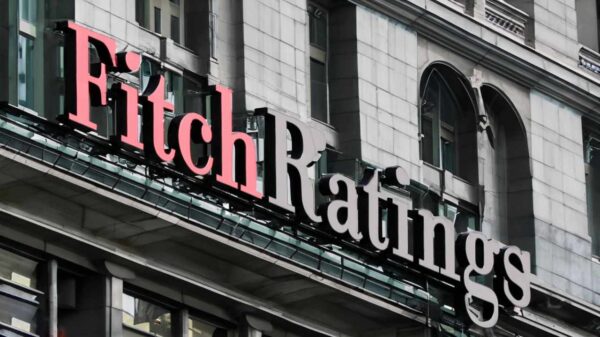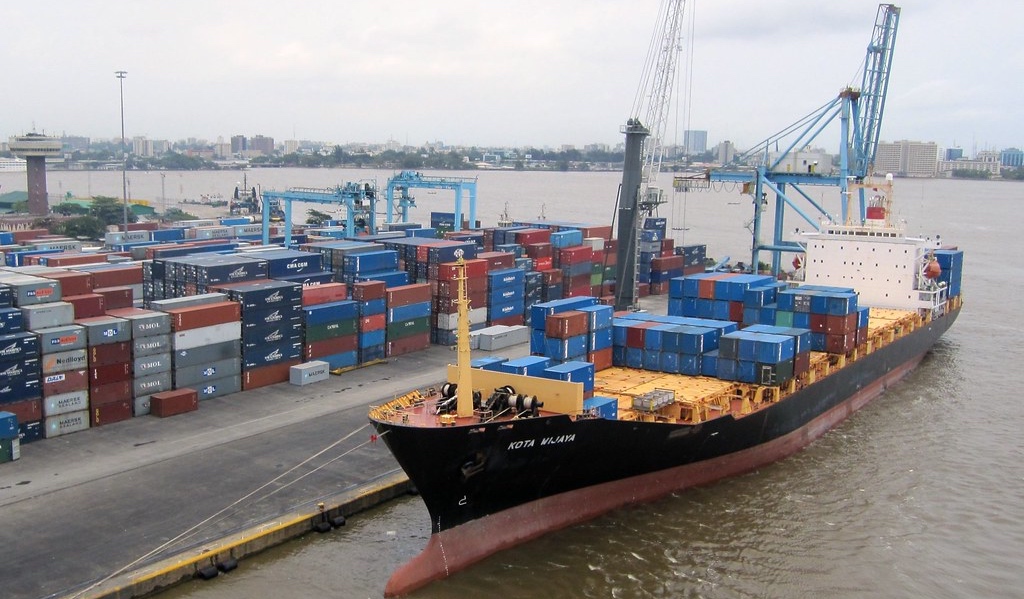Nigeria’s foreign trade balance leapfrogged to a surplus of $1.1 billion in Q4 2021, as export value surpassed import bill for the first time since Q3 2019, representing 8 consecutive quarters of negative trade balance.
This is according to data on foreign trade obtained from the Central Bank of Nigeria (CBN).
According to the data, Nigeria’s international trade balance increased significantly from a deficit of $327 million recorded in the previous quarter to $1.1 billion in Q4 2021. Similarly, when compared to the corresponding period of the previous year, Nigeria’s trade balance increased by 115% from $7.57 billion deficit recorded in Q4 2020.
Meanwhile, the aggregate trade balance for the year 2021 still lies in the negative region at $6.49 billion, although better than the $21.37 billion negative balance recorded in the preceding year.
A further breakdown of the data from the apex bank, showed that export earnings dropped marginally by 3.5% from $13.42 billion recorded in Q3 2021 to $12.95 billion in Q4 2021, while import bill reduced by 13.8% from $13.74 billion to $11.85 billion in the review period.
This implies that the positive trade balance was driven by a significant decline in import bill rather than an increase in export value.
Highlight
- Nigeria’s total foreign trade declined by 8.7% in Q4 2021, moving from $27.16 billion recorded in the previous quarter to $24.8 billion.
- On the other hand, when compared to the corresponding period of 2020, total merchandise trade appreciated marginally by 1.4% from $24.45 billion recorded in Q4 2020.
- On an annual basis, total trade increased by 7.1% in 2021 from $93.26 billion in the previous year to $99.86 billion.

Backstory
In December 2021 that Nigeria’s foreign trade skyrocketed by 58.6% year-on-year in the third quarter of 2021, reaching a record high of N13.28 trillion from N8.38 trillion recorded in the corresponding period of 2020.
According to the report, the surge in total trade was attributed to the 51.5% increase in import bill, which however, resulted in a deficit of N3.02 trillion balance of trade. During the period also, crude oil export increased by 78% year-on-year from N2.42 trillion in Q3 2020 to N4.03 trillion in Q3 2021.
Nigeria’s recurring foreign trade deficit can be attributed to the fall in the price of crude oil towards the end of 2019, when crude oil prices fell below $60 per barrel in October 2019 during the first outbreak of the covid-19 pandemic.
The bearish performance in the crude oil market extended into 2020, as the price of Brent crude fell to as low as $15.17 per barrel in April 2020, before picking up later in the year.
Dependence on imports continues to weaken trade position
The continuous reliance on imported items by Nigerians without commensurate export value continues to erode our weak earnings, further piling more pressure on our exchange rate. Crude oil export, which accounts for over 90% of Nigeria’s FX earnings has been affected in recent times by the combination of market performance, cut in OPEC supply, which has been exacerbated by our inability to meet production quota.
According to the National Bureau of Statistics, Nigeria’s daily crude oil production declined to 1.5 million bpd in Q4 2021 from 1.57 million bpd recorded in the previous quarter. Its average production capacity endured four consecutive quarters of decline in 2021.
Also, the dependence on foreign goods to meet local demands has made it difficult for Nigeria to boasts of a noteworthy foreign trade balance because the little FX that finds its way into the economy is being used to finance export obligations, hereby tightening FX liquidity in the economy.
Additionally, despite the amount spent on the agricultural sector by the Central Bank, Nigeria has not been able to improve the agricultural value chain and facilitate significant Agric export.
What you should know
- Foreign trade captures the monetary value of goods and services between Nigeria and other countries of the world. It is a very important component of the balance of payment data as it indicates the amount that comes into the economy through the sales of goods as well as what it spent on the importation of various items.
- A foreign trade surplus occurs when the export earnings of a country surpasses the import bill, while a trade deficit occurs when import spending surpasses export earnings. Nigeria recorded its first quarterly trade surplus in over two years in Q4 2021, as crude oil prices, which is a major source of Nigeria’s foreign inflow already edging close to $100 per barrel.
- Nigeria will hope to continue with the positive trajectory in the new year, following a positive current account balance printed in Q3 2021 and the continuous rally at the crude oil market.
- FOR MORE INFORMATION VISIT: https://ksbcjournal.com/
Article Originally Published Here























































You must be logged in to post a comment Login